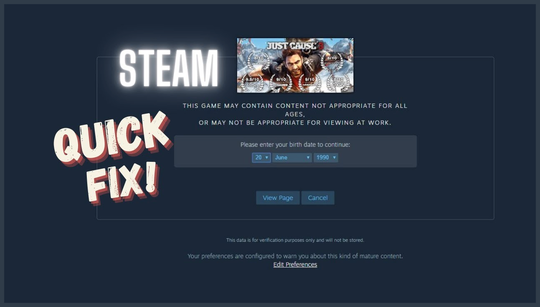Why does Steam keep asking your age?
The process is simple, but there’s a lot more to it than meets the eye. Rating agencies are responsible for age gating, and there’s a good chance that you dislike them as much as you dislike Steam’s Age Verification pop-up. In fact, many Steam users would probably go as far as to say that the entire process is obnoxious. But why?
Many Steam users appreciate age verification. After all, it prevents children from accessing explicit games, movies, and other content. However, some gamers are of the opinion that Valve should implement more rigorous age verification measures.
There are some games that include pornographic content that is not suitable for children. In the US, age gating is based on ESRB compliance. However, not all games that include adult content pay the associated fees to obtain ESRB ratings. As such, some games that include adult content can circumvent age gating rules.
In reality, there’s a lot more going on behind the scenes to ensure that Steam does not allow children to access inappropriate content. Here’s what you need to know about Steam’s age verification process.
Steam age verification pop-ups explained
Steam age verification pop-ups are often tiresome and are often criticized by the community. However, this is partly due to the fact that cookie consent buttons are a direct result of misguided lawmakers.
The real issue is the manner in which websites use cookie consent buttons in order to exploit choice fatigue and maximize profits.
For GDPR compliance, websites need to obtain user consent for cookie usage. However, a lot of websites function even if you don’t give your consent. According to the European Commission, “it is difficult to assess whether consent is freely given if there is no real option to refuse the use of cookies”. As such, GDPR necessitates obtaining user consent for cookie usage, which results in the intrusive pop-ups that you’re probably familiar with.
Evidence suggests that most websites function even if you don’t give your consent. In fact, many websites rely on tracking cookies to function. Without these cookies, the vast majority of websites would cease to function.
Many Steam users find these pop-ups tiresome and blame GDPR instead of the websites themselves. However, there’s a good chance that you’re being manipulated by websites. In addition to being tiresome, pop-ups often make you feel guilty for accessing a website that seemingly cares about your privacy.
To defend Steam, some users point out that Valve is simply following regulations. After all, it would be difficult for Valve to justify allowing children to access inappropriate content on the platform.
While it’s true that Steam is simply following regulations, there’s another side to the story. Some Steam users find corporations using manipulative language that appears empathetic to be particularly grating.
Others are quick to point out that Steam is a private company, and as such, it’s able to conduct business in whichever manner it sees fit. Steam is not bound by GDPR regulations and can use cookies for any purpose that it deems appropriate.
Is Steam age verification secure?
Another aspect of Steam’s age verification process that you may find confusing is the option to select an age through a cookie. This allows the cookie to remember your selected date and simplifies the entire process.
However, some users point out that rating agencies have restrictions on storing age information beyond a single browsing session. If Valve is following the rules, then it would have to find another way of age gating.
In actuality, Valve already has a solution. Steam already uses a Boolean attribute to indicate if you are an adult. However, it doesn’t always store this information. Instead, it only uses this information to determine whether or not you can access content rated Mature.
In short, Valve can use the age Boolean to determine whether you are an adult and store this information on its servers. Rating agencies have restrictions on storing age information beyond a single browsing session, but Valve could simply use the Boolean to ensure that users can’t access Mature content without being flagged.
Generally speaking, many Steam users are unhappy with the restrictions imposed by rating agencies. These users often find the practices of these agencies to be particularly obnoxious.
In any case, it’s difficult to argue with Steam’s decision to comply with regulations.














